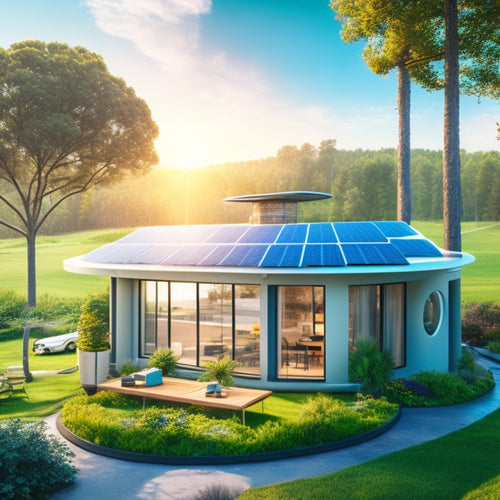
Panel Efficiency: Calculate Long-Term Energy Production Accurately
Share
To accurately calculate long-term energy production, you need to examine solar panel degradation, which affects energy production capacity over time. Factors like temperature fluctuations, humidity, UV radiation, and physical stress can lead to degradation. Regular inspection and maintenance are vital to identify potential issues and refine degradation models. By understanding the factors affecting degradation rates, such as temperature and humidity, you can better predict capacity loss. Analyzing historical solar irradiance data and performance monitoring data allows for precise energy production forecasting. Now, take the next step to understand the complexities of degradation and optimize your solar panel system's performance.
Key Takeaways
- Accurate energy production forecasting requires evaluating solar irradiance impact on system performance and analyzing historical data.
- Regular maintenance prevents up to 20% efficiency loss through cleaning, ensuring optimal system output and energy independence.
- Combining datasets of solar irradiance and performance monitoring data enables precise energy production forecasting and maximizes system output.
- Understanding degradation mechanisms, such as temperature and humidity, is crucial for calculating capacity loss over time and anticipating energy production decline.
- Regular inspection and maintenance are vital to identify potential issues, refine degradation models, and inform maintenance and upgrade strategies.
Understanding Solar Panel Degradation
As you consider investing in a solar panel system, understanding solar panel degradation is vital because it directly impacts the system's overall performance and longevity.
Solar panels, like any other electronic device, deteriorate over time, reducing their energy production capacity. This degradation affects the solar panel lifespan, which is typically around 25-30 years.
Various degradation mechanisms contribute to this decline, including temperature fluctuations, humidity, UV radiation, and physical stress.
Recycling solar panels reduces environmental harm and conserves natural resources, making it a significant aspect of sustainable energy production.
Understanding these mechanisms helps you anticipate and prepare for the gradual decrease in energy production.
Calculating Capacity Loss Over Time
Calculating capacity loss over time requires a thorough understanding of the degradation mechanisms at play, allowing you to accurately predict the decline in energy production and plan accordingly.
Regular inspection and maintenance, as outlined in the solar panel maintenance checklist, are vital in identifying and addressing potential issues that can contribute to capacity loss.
To do this, you'll need to employ degradation models that account for the various factors contributing to capacity loss. A long-term analysis is essential, as it enables you to identify patterns and trends in capacity degradation.
By analyzing the data, you can refine your degradation models, guaranteeing they accurately reflect the actual performance of your solar panels. This, in turn, allows you to make informed decisions about maintenance, replacement, and system upgrades.
Factors Affecting Degradation Rate
When evaluating capacity loss, you've likely noticed that degradation rates vary considerably depending on the specific conditions your solar panels operate under. Several factors contribute to this variation, including environmental impact and maintenance practices.
| Factor | Description | Impact on Degradation Rate |
|---|---|---|
| Temperature | High temperatures can reduce panel efficiency | Increases degradation rate |
| Humidity | High humidity can cause corrosion and damage | Increases degradation rate |
| Cleaning Frequency | Infrequent cleaning can lead to dirt and debris accumulation | Increases degradation rate |
Understanding these factors is essential for accurately calculating long-term energy production. By considering the specific conditions your panels operate under, you can better estimate capacity loss and optimize your solar panel system for maximum energy output.
Measuring Panel Efficiency Decline
Your solar panel system's performance is only as good as its weakest link, and that's often the panels themselves. To guarantee ideal energy production, you need to measure panel efficiency decline accurately.
Regular panel maintenance is essential in identifying potential issues that can lead to decreased efficiency, as a well-planned maintenance schedule extends equipment lifespan and aids in early issue identification.
Furthermore, following manufacturer guidelines assures peak performance and extends equipment lifespan while guaranteeing warranty compliance.
Efficiency testing, such as flash testing and insulation resistance testing, helps you detect any degradation in your panels. By conducting these tests, you can identify the rate of decline and take corrective measures to maintain your system's performance.
Regular monitoring and maintenance enable you to make data-driven decisions, making certain your solar panel system operates at its best.
Accurate Energy Production Forecasting
As you've taken steps to measure and maintain your solar panel system's efficiency, you're now primed to accurately forecast energy production.
To do this, you'll need to evaluate the solar irradiance impact on your system's performance. This involves analyzing historical data on solar irradiance in your location, as well as your system's performance monitoring data.
Regular maintenance, including cleaning and inspecting connections, is essential for optimizing performance and ensuring longevity, as regular cleaning of solar panels can prevent up to 20% efficiency loss.
By combining these two datasets, you can create a highly accurate forecast of your system's energy production over time. This allows you to better plan for energy usage and make informed decisions about your energy independence.
With accurate forecasting, you'll be able to maximize your system's output and enjoy the freedom that comes with relying on clean, renewable energy.
Frequently Asked Questions
How Do Environmental Factors Impact Solar Panel Efficiency Over Time?
You'll find that environmental factors considerably impact solar panel efficiency over time, with temperature effects, dust accumulation, and humidity levels all playing a role, while shading impacts, weather variability, and geographic location also influence performance, affecting your energy freedom.
Can Panel Efficiency Be Improved Through Maintenance or Repair?
You can enhance panel efficiency through regular maintenance, including panel cleaning to remove debris and performance monitoring to identify underperforming panels, allowing you to take corrective action and maximize energy production over time.
What Is the Average Lifespan of a Residential Solar Panel System?
You're investing in a residential solar panel system and wondering about its lifespan. Typically, you can expect 25-30 years of efficient energy production, with some panels lasting up to 40 years, thanks to improved solar panel durability and lifespan expectations.
How Does Panel Angle and Orientation Affect Energy Production?
You'll maximize energy production by adjusting panel angle and orientation for ideal tilt, ideally between 30-40 degrees, and consider sun tracking systems to flexibly shift panels for up to 45% more energy output.
Can Solar Panels Be Recycled at the End of Their Life Cycle?
You'll be relieved to know that yes, solar panels can be recycled at the end of their life cycle, undergoing end-of-life processing, where precious materials like silicon and aluminum are recovered through solar panel recycling, minimizing waste and environmental impact.
Related Posts
-

3 Ways Wind Power Boosts Home Value
Living near a wind farm can enhance your property's value in three significant ways. To begin with, proximity to wind...
-

Why Biodegradable Dish Soap Matters for Earth-Conscious Homes
You likely don't realize that the dish soap you're using today will still be harming the environment long after you'v...
-

Gamify Your Home's Energy Generation and Savings
You're taking the next step in optimizing your home's energy generation and savings by utilizing the power of gamific...


